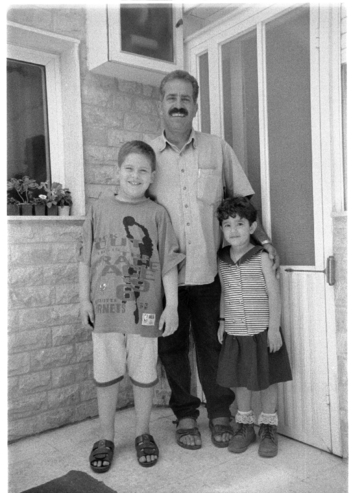
|
 |
| Wajih Atallah (Ra'ida Shehadeh's brother-in-law) with two of his children, Kalandia |
| Ra'ida Shehadeh, Kalandia camp, June 12:
|
|
Ra'ida is the sister of Wajih's wife, and -- unmarried -- lives with them. I decide to record with her because she has experienced imprisonment as a school girl, and for rather a long time - one and a half years. An added reason is her relatively young age, born in exile, sometime in the mid-'60s. I'm worried that my sampling is far too weighted towards older women, those who can recall expulsion from Palestine. These are the speakers most often recommended to me. Also I feel it is important to record their experiences before it is too late.
This small family composed of three adults and four children offers a striking contrast to the large, rambunctious, child-filled homes I have just come from. Wajih's house is similarly different, perhaps not larger in total area, but carefully carved out into an eating area, separate bedrooms, cupboards and well-equipped kitchen. Unusual in camps, the home is surrounded by a high wall, giving privacy and space for a small garden. I admire the design and carpentry. Wajih says he did it himself as a way to use time during the curfews imposed in the first Intifada. When telling of her prison experience Ra'ida amusingly satirizes the partisanship that reigned among the Palestinian women prisoners, each group trying to gain converts to their Resistance group. But apart from this, her testimony casts an insightful glance back over growing up in poverty in a camp, how she was prevented by anxiety from concentrating on studies, and by her father from getting professional training. Prisoners were supposed to have priority for civilian jobs, but she had waited three years without success. She gives a bleak description of the state of children in the |
camp today, a large section of them illiterate. This is the 'generation of the Intifada', their schooling fatally interrupted, their parents neglectful.
Ra'ida Shehadeh speaks While in secondary school I was arrested. I was in 2nd secondary. It was in 1981. I was arrested with a group of young men and girls. Of course we were subjected to a period of interrogation in the Moscobiyya in Jerusalem. I spent 30 days in a cell. Naturally we were subjected to harassment, beatings, insults and torture. I lost around 13 kilos in weight in the Moscobiyya. I got dehydrated. They moved me to [an Israeli hospital]. Because of going to hospital, they moved me from a cell to a room. We all confessed. We confessed to [belonging to] an organization, Fateh, and to other organizations, to typing pamphlets, putting up posters, writing on walls. There was one thing that the mukhabarat focused on in their interrogation, the attempted assassination of a woman who worked with the Israeli authorities..." |
[Umm Ali Muhasil Arslan] [Ferial Rasheed Khamis Abu Heykal] Copyright©2005 |
|